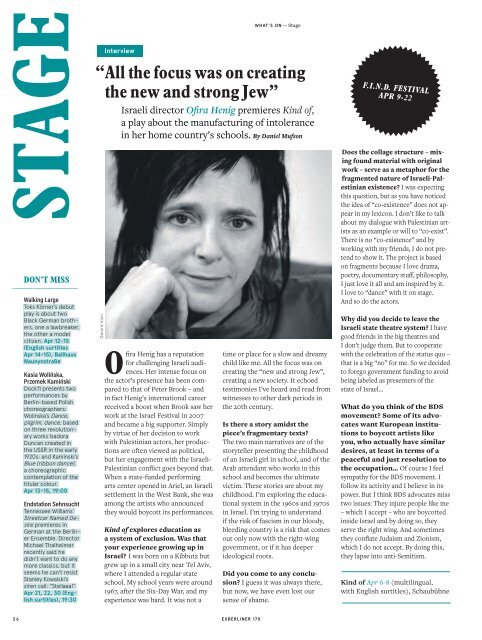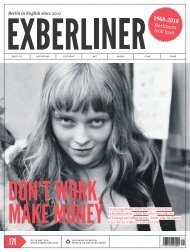EXBERLINER Issue 170, April 2018
Create successful ePaper yourself
Turn your PDF publications into a flip-book with our unique Google optimized e-Paper software.
WHAT’S ON — Stage<br />
DON’T MISS<br />
Walking Large<br />
Toks Körner’s debut<br />
play is about two<br />
Black German brothers,<br />
one a lawbreaker,<br />
the other a model<br />
citizen. Apr 12-15<br />
(English surtitles<br />
Apr 14-15), Ballhaus<br />
Naunynstraße<br />
Kasia Wolińska,<br />
Przemek Kamiński<br />
Dock11 presents two<br />
performances by<br />
Berlin-based Polish<br />
choreographers:<br />
Wolinska’s Dance,<br />
pilgrim, dance, based<br />
on three revolutionary<br />
works Isadora<br />
Duncan created in<br />
the USSR in the early<br />
1920s; and Kaminski’s<br />
Blue (ribbon dance),<br />
a choreographic<br />
contemplation of the<br />
titular colour.<br />
Apr 13-15, 19:00<br />
Endstation Sehnsucht<br />
Tennessee Williams’<br />
Streetcar Named Desire<br />
premieres in<br />
German at the Berliner<br />
Ensemble. Director<br />
Michael Thalheimer<br />
recently said he<br />
didn’t want to do any<br />
more classics, but it<br />
seems he can’t resist<br />
Stanley Kowalski’s<br />
siren call: “Stellaaa!”<br />
Apr 21, 22, 30 (English<br />
surtitles), 19:30<br />
Interview<br />
“ All the focus was on creating<br />
the new and strong Jew”<br />
Israeli director Ofira Henig premieres Kind of,<br />
a play about the manufacturing of intolerance<br />
in her home country’s schools. By Daniel Mufson<br />
Gerard Alon<br />
Ofira Henig has a reputation<br />
for challenging Israeli audiences.<br />
Her intense focus on<br />
the actor’s presence has been compared<br />
to that of Peter Brook – and<br />
in fact Henig’s international career<br />
received a boost when Brook saw her<br />
work at the Israel Festival in 2007<br />
and became a big supporter. Simply<br />
by virtue of her decision to work<br />
with Palestinian actors, her productions<br />
are often viewed as political,<br />
but her engagement with the Israeli-<br />
Palestinian conflict goes beyond that.<br />
When a state-funded performing<br />
arts center opened in Ariel, an Israeli<br />
settlement in the West Bank, she was<br />
among the artists who announced<br />
they would boycott its performances.<br />
Kind of explores education as<br />
a system of exclusion. Was that<br />
your experience growing up in<br />
Israel? I was born on a Kibbutz but<br />
grew up in a small city near Tel Aviv,<br />
where I attended a regular state<br />
school. My school years were around<br />
1967, after the Six-Day War, and my<br />
experience was hard. It was not a<br />
time or place for a slow and dreamy<br />
child like me. All the focus was on<br />
creating the “new and strong Jew”,<br />
creating a new society. It echoed<br />
testimonies I’ve heard and read from<br />
witnesses to other dark periods in<br />
the 20th century.<br />
Is there a story amidst the<br />
piece’s fragmentary texts?<br />
The two main narratives are of the<br />
storyteller presenting the childhood<br />
of an Israeli girl in school, and of the<br />
Arab attendant who works in this<br />
school and becomes the ultimate<br />
victim. These stories are about my<br />
childhood. I’m exploring the educational<br />
system in the 1960s and 1970s<br />
in Israel. I’m trying to understand<br />
if the risk of fascism in our bloody,<br />
bleeding country is a risk that comes<br />
out only now with the right-wing<br />
government, or if it has deeper<br />
ideological roots.<br />
Did you come to any conclusion?<br />
I guess it was always there,<br />
but now, we have even lost our<br />
sense of shame.<br />
F.I.N.D. FESTIVAL<br />
APR 9-22<br />
Does the collage structure – mixing<br />
found material with original<br />
work – serve as a metaphor for the<br />
fragmented nature of Israeli-Palestinian<br />
existence? I was expecting<br />
this question, but as you have noticed<br />
the idea of “co-existence” does not appear<br />
in my lexicon. I don’t like to talk<br />
about my dialogue with Palestinian artists<br />
as an example or will to “co-exist”.<br />
There is no “co-existence” and by<br />
working with my friends, I do not pretend<br />
to show it. The project is based<br />
on fragments because I love drama,<br />
poetry, documentary stuff, philosophy,<br />
I just love it all and am inspired by it.<br />
I love to “dance” with it on stage.<br />
And so do the actors.<br />
Why did you decide to leave the<br />
Israeli state theatre system? I have<br />
good friends in the big theatres and<br />
I don’t judge them. But to cooperate<br />
with the celebration of the status quo –<br />
that is a big “no” for me. So we decided<br />
to forego government funding to avoid<br />
being labeled as presenters of the<br />
state of Israel...<br />
What do you think of the BDS<br />
movement? Some of its advocates<br />
want European institutions<br />
to boycott artists like<br />
you, who actually have similar<br />
desires, at least in terms of a<br />
peaceful and just resolution to<br />
the occupation... Of course I feel<br />
sympathy for the BDS movement. I<br />
follow its activity and I believe in its<br />
power. But I think BDS advocates miss<br />
two issues: They injure people like me<br />
– which I accept – who are boycotted<br />
inside Israel and by doing so, they<br />
serve the right wing. And sometimes<br />
they conflate Judaism and Zionism,<br />
which I do not accept. By doing this,<br />
they lapse into anti-Semitism.<br />
Kind of Apr 6-8 (multilingual,<br />
with English surtitles), Schaubühne<br />
36<br />
<strong>EXBERLINER</strong> <strong>170</strong>

















